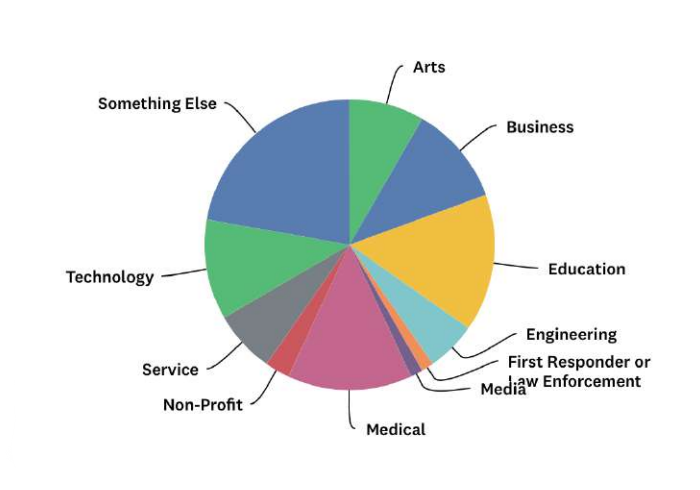As things are opening up again, many will consider what they really want from their careers.
If you haven’t taken our job survey before, please consider doing it HERE. It is for dyslexic adults only.
Here is the sampling of jobs from this survey:

Highest sectors included “something else”, education, medical, technology, and business.
Many of the respondents answered before the COVID years, but “something else” included careers in architecture, agriculture, hospitality, wildlife management, social work, and non-profit.
WHAT TYPE OF WORK SHOULD BE AVOIDED?
The consensus was clearly repetitive work and jobs that don’t value individuality or creativity. Many respondents expressed the importance of being able to create your own rules and work environment. Many had cautions about jobs with extensive desk work, but some also said administrative jobs were possible with a secretary.
“Basically, you will need to go for a position where you will be able to lead. Working under bosses less bright than you are will be unsatisfactory because if the boss is not at your level they will be uneasy about you.”
“Jobs where each step is “choreographed”… face it our Brains ARE different so it frequently will just NOT work for us to try to do things the same ways non-dyslexic people do.”
“Jobs in which you are not required to think outside the box.”
“Working in a large firm where there is a lot of boring tedious work.”
JOBS THAT ARE GOOD FOR DYSLEXIC PEOPLE
“Work in the gray areas where no one knows the rules. Where you are adding value to the community you work within and the world.”
“I’ve only had a career as an IT tech and software dev, but my guess is this applies no matter what you do for a living. The problem solving aspect of dev work is really appealing for dyslexics. Also, understanding your personality type will help you cope with how you communicate and handle conflict with colleagues / bosses. And finding the right company is an important too. Companies that are very fast paced / hard deadline, will put a lot of strain on you. our minds don’t usually perform better under stress, but worse. Smaller companies are going to require more responsibility and rely on you more to perform quickly and with large amounts of productivity. larger ones are more likely to share the work load and not put as much strain on the team to perform and meet deadlines.”
“Music, technology, and the caring professions.”
“Healthcare is a little bit more understanding.”
“Any job that requires organizational skills. It is one of the dyslexic coping skills.”
“The traditional entry through credentials, resumes, and cover letters may not be your best entry. Disregard what others tell you. Do the things that you can do that add to the human experience. Your uniqueness is what matters the most. Then work really hard at it. You may have to work a lot harder than others.”
“Do what makes you happy and what you enjoy.”
“Ask what kinds of work give you energy and notice what tasks drain you. ”
“Try different jobs and be honest with your employer. ”
“Choose whatever job suits you even if you have to quit 100 times.”
“Find what interests you or what you’re passionate about. With all the struggles associated with LD, going after something you don’t care about can make it that much harder to rise above academic challenges.”
“Choose something that is a passion or a hobby.”
“A career that uses your intellectual strengths.”
“I happen to be in Computers, Math was not that bad but Chemistry I didn’t do well. Programming I do very well and when I started out I was able to see my finished code in my head prior to finishing what I wrote. This allowed me to advance quickly. People are amazed at my troubleshooting skills.”
“Don’t get anything overly “structured”, nothing where “time on task” is monitored or “efficiency experts” have all the movements, etc. choreographed like some bizarre ballet. Instead go for things where you have a particular thing to get done, but where you can structure HOW you do it. Then consider your ” differences” a good thing, maybe you will find a better creative solution, (just make sure hey actually work under all conditions). I’m in IT & have had people complement me on my “different” way of approaching things. But it doesn’t HAVE to be in the IT field. Like I mentioned go for jobs where there is a well defined “thing” to be done (so you will not be mixed up about what you are expected to accomplish) but HOW it gets done is up to you.”
“Do internships in middle/ high school, start volunteering in middle/high school, see what’s out there, before you decide on a major.”
“See how you contribute positively to others. DO THINGS, get experience, and then move on. You can always come back. This helps to filter where your strengths and weaknesses lie.”
“You should never stop evolving yourself. Career paths change and morph into new ones. Do what you’re passionate about.”
“Find jobs you enjoy doing. I loved to repair broken things. I had a bag of tricks that the fireman called the box that had many good parts for lawn mowers and cars and trucks that could fix things.”
“Choose something where your dyslexic skills are desirable and you will be reminded that you are smart and valuable repeatedly. Also, don’t feel like you have to choose. You can also go with the flow and follow your passions. You will eventually find your niche. ”
“Follow your passion and get a virtual assistant or software that suits your needs. Self-employment is a good option for learning in the real world!”
“I started with mundane jobs. Each job was better than the last and eventually I ended up with what I wanted to do.”
“Try to do something in a field you’re interested in. If you choose the wrong area, change, move on, time and happiness are precious.”
“Be aware of jobs that require productions and tediousness. Those can be a challenge for dyslexics who need more time.”
“Dyslexics have a unique ability to see matters from multiple perspectives. Look for careers that help you do just that, whether that is in a corporate setting (like me) or in more physical work.”
“I have great success in sales. Most of my job is verbal and I work at my own pace.”
















